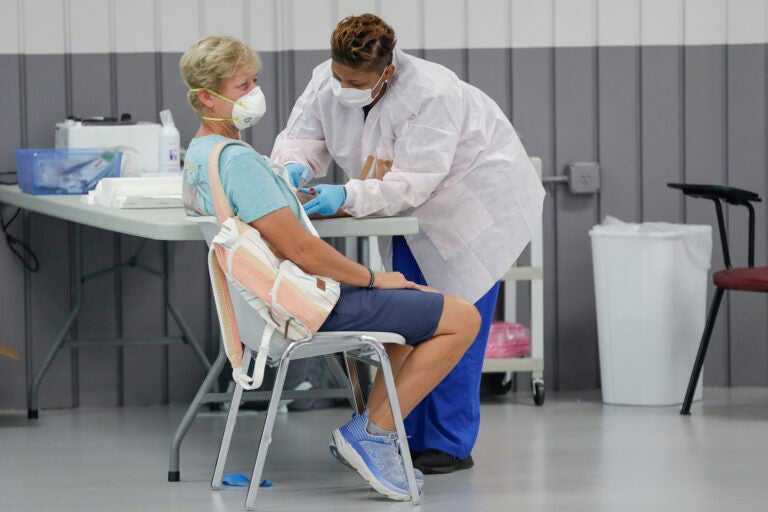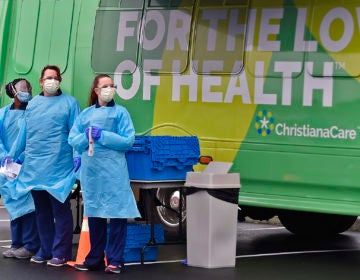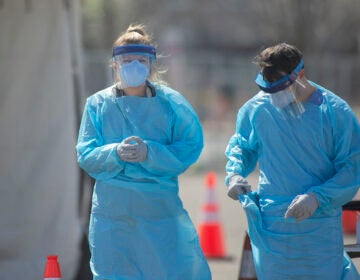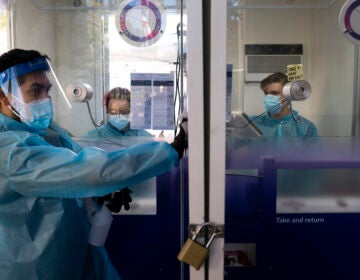Coronavirus update: Chesco clears antibody testing hurdle; Philly launching rent-assistance program
Chester County has contracted with Lehigh Valley Genomics, an approved lab in Bethlehem, to monitor the tests and will offer them at two locations.

Health worker Eboni Smith, right, draws blood from a patient during a COVID-19 antibody test at the Volusia County Fairgrounds Tuesday, May 5, 2020, in DeLand, Fla. (AP Photo/John Raoux)
Updated 4:55 p.m.
Are you on the front lines of the coronavirus? Help us report on the pandemic.
Pennsylvania had 1,415 new positive COVID-19 cases Friday, a 2.53% increase in total cases over the previous day. Over the past seven days, the commonwealth has recorded an increase of 7,807 cases, or 15.75%.
The state has recorded 57,371 positive cases out of more than 295,325 tested.
Statewide, Pennsylvania had new 124 deaths as of Friday, for a total of 3,658. The Department of Health says this is the result of “continued work to reconcile data from various sources,” and that the deaths have occurred “over the past several weeks.”
Philadelphia reported 470 new positives Friday. The city has recorded 17,517 cases so far, and 875 deaths.
Philly launches ‘emergency rental assistance program’ due to COVID-19
City Hall will launch a new $10 million initiative that aims to provide rental assistance to 3,000 families in Philadelphia as many residents struggle to make payments during the coronavirus shutdown.
The COVID-19 Emergency Rental Assistance Program, funded with a Community Development Block Grant through the federal CARES Act, will provide up to three months of rental subsidies to certain households earning 50% or less of the area median income prior to the COVID-19 shutdown — about $48,300 per year for a family of four.
“Unprecedented job losses have placed financial pressure on both renters and landlords,” Mayor Jim Kenney said in a prepared statement. “The COVID-19 Emergency Rental Assistance Program will help thousands of Philadelphia renters and, in turn, help landlords. Keeping people in their homes is critical during this crisis.”
Applicants must currently have a valid lease to rent an apartment or house in Philadelphia and must have lost income because of COVID-19. Renters must submit proof of income loss for all adult members of the household, a valid ID that matches the name on the lease, and a signed affidavit confirming loss of income due to COVID-19.
Renters are not eligible if they currently live in public housing, receive other government rental assistance, have unpaid rent from before April, or are currently in the process of being evicted.
Applicants do not have to have been diagnosed with COVID-19 to be eligible.
Applications may be submitted via a new website called PHLRentAssist.org to accept applications, with paper application forms available through the city’s 311 nonemergency hotline.
Submissions will begin Tuesday, May 12, at 10 a.m., with a deadline to apply of Saturday, May 16, at 5 p.m.
The city is also soliciting tax-deductible donations from Individuals and corporations to extend the longevity of the program.
Chester County can now do antibody tests announced in April
Chester County announced a month ago that it would do COVID-19 antibody testing for first responders, health care workers and the people who Iive with them, but the county quickly ran into regulatory issues.
It had a local company ready to supply tests, but the county needed to do the tests at a lab approved to do antibody testing. The Pennsylvania Department of Health grants those approvals. A department representative said that, as regulators, the department and its lab could not partner with other labs to oversee their testing.
On Friday, the county said that it has contracted with Lehigh Valley Genomics, an approved lab in Bethlehem, to monitor the tests and will start offering them at two locations: the Chester County Public Safety Training Campus in South Coatesville and Longwood Gardens in Kennett Square. Anyone seeking a test must register online for an appointment, and the details are being shared among people who are first responders, or work at hospitals, health care, and long-term care facilities, according to a press release from the county.
The test is a blood test that takes 15 minutes. It tests for antibodies and not the coronavirus itself. It’s more of a test of whether someone has ever been exposed to the virus in the past. Advaite, the biotech company supplying the tests for Chester County, says anyone getting the test should follow up with a traditional swab test to confirm a COVID-19 diagnosis. Having antibodies does not mean someone is immune to COVID-19.
More Pa. counties cleared to partially reopen
Gov. Tom Wolf announced Friday that 13 more counties across Pennsylvania would move into the “yellow phase” of reopening from the COVID-19 shutdown on May 15, following the color-coded scheme introduced in late April.
The step will allow many retail businesses in those counties –– mostly in the western part of the state –– to operate with social distancing policies. The counties will join the roughly two dozen that partially reopened this week.
However, the governor still cautioned that residents were at risk, despite the tentative thaw.
“Every contact between two people is a new link in the chain of potential transmission. And if the new case count begins to climb in one area, restrictions will need to be imposed to prevent local medical facilities from becoming overwhelmed. So Pennsylvanians should continue to make good choices,” Wolf said.
Allegheny, Armstrong, Bedford, Blair, Butler, Cambria, Fayette, Fulton, Greene, Indiana, Somerset, Washington, Westmoreland counties all received permission to ratchet down from the statewide shutdown order.
The only western county not included was Beaver County, which recently saw an outbreak of COVID-19 cases at a nursing home. The Beaver County district attorney says he intends to defy the governor’s order and will refuse to prosecute those who ignore the shutdown order.
Wolf has otherwise extended the stay-at-home order into June for counties still in the red phase of the coronavirus shutdown.
Casey bill would direct $20 billion to aid COVID-hit nursing homes
Legislation proposed by U.S. Sens. Bob Casey, D-Pa., and Sheldon Whitehouse, D-R.I., would direct $20 billion in federal funding to aid nursing homes and other long-term care facilities during the COVID-19 crisis.
The Nursing Home COVID-19 Protection and Prevention Act would channel extra funds to purchase of personal protective equipment and additional testing and pay for nursing home workers, with the aim of slowing the spread of the coronavirus.
A prepared statement from Casey’s office said the bill was recognition of the fact that “1 in 4 deaths from COVID-19 in the United States” has occurred in nursing facilities.
“This virus spares no state, no county, no facility. The unprecedented crisis unfolding in our nation’s nursing homes demands an immediate, extraordinary response,” Casey said.
Many elder-care facilities — which house some 1.3 million Americans — have struggled to contain the spread of the virus because of their set-up and the lack of protective gear or test kits. Others, paradoxically, have turned to housing recovering COVID-19 patients as the shutdown order takes a financial toll on long-term care facilities.
Casey’s bill would also require the Department of Health and Human Services to develop “guidance on cohorting best practices” and would mandate the collection and publication of “data on COVID-19 cases and deaths in nursing homes and intermediate care facilities.”
WHYY is your source for fact-based, in-depth journalism and information. As a nonprofit organization, we rely on financial support from readers like you. Please give today.




![CoronavirusPandemic_1024x512[1]](https://whyy.org/wp-content/uploads/2020/03/CoronavirusPandemic_1024x5121-300x150.jpg)




